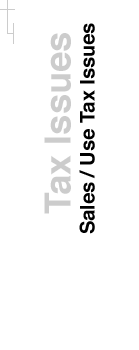 | Sales/Use Tax Issues |  | ||||||
| home » sales/use tax issues » definition » | ||||||||
 | What is a Sales Tax and What is a Use Tax? Understanding the nature of a sales tax is critical to establishing an effective program to administer the tax. So, what is it? Sales Tax: The sales tax is a tax on the sale at retail of tangible personal property and certain taxable services Sounds simple, doesn't it? But watch out. There are significant consequences in not fully understanding that simple sentence. First we need to define some terms: Sale at Retail: This is a sale to the end user, i.e. the ultimate consumer of the product or service. Tangible Personal Property: First, the term "tangible" means that the item is perceptible to the senses. You can see it, feel it, touch it, etc. To be more specific it is something that takes up physical space. Next, the term "personal property" is any property that is not "real property". So, of course, the next question is: What is "real property?" "Real Property" is generally defined as any property that is permanently affixed to land. Caution: The distinction between personal and real property can be a very tricky. And, it is a critical distinction to make because the sale of tangible personal property is taxable, but the sale of real property is not. Also, when reading that simple sentence above (defining the sales tax), it leads to certain presumptions about the taxability of the transactions. Understanding two presumptions are key to determining that taxability of the sale:
In other words, if you sell tangible personal property to someone else, that sale is presumed to be taxable unless it is specifically excluded/exempted by statute. On the other hand, if you sell a service to someone, that sale is presumed to be non-taxable unless that service is specifically included by statute. The presumption of taxability is also important in another sense. Have you ever heard the term "innocent until proven guilty?" Unfortunately, that is not the way it works in connection with the sales tax. When you make a sale of tangible personal property or a taxable service, the sale is presumed to be taxable, which means the burden of proof to show that it is not a taxable transaction falls on you. Use Tax: A use tax is a tax on the storing, using, consuming, and sometimes distributing tangible personal property or providing a taxable service. In other words, you will be subject to the use tax in the state where that event occurs. To clarify, storing, as used in this context, does not mean storing for resale, demonstration or display. Your inventory held for resale is not subject to a use tax. You might be saying to yourself, "Wait a minute. When the sale of that tangible personal property was made it was subject to a sales tax. Now when I store, use, or consume that item it is subject to a use tax. Aren't we paying the tax twice?" The answer is no. A use tax is considered a compensating tax or complementary tax. This means the use tax is assessed and due on the property or taxable service when the sales tax has not been paid. For example, have you ever bought something from a mail order company and they did not charge you tax on the item. Did you self-access and pay the use tax due on that item. You see, you bought an item and did not pay sales tax to the seller, but you stored, used, or consumed that item in your state. The purchase is now subject to your state's use tax. By the way, some states will exempt a mail order purchase if it is under a certain dollar amount. Regardless, the general principle applies in all states that have sales and use tax. Once we understand the basic structure of the sales and use taxes the next question is, who is responsible for collecting and who is responsible for remitting the appropriate tax? See the section entitled, "When must you register, collect and remit sales or use taxes in another state? What is seller's Nexus? " section of our web site for further explanation.
Feel free to call or e-mail us to discuss any tax issues you may have.
| |||||||
| Last modified on Sat Oct 18 2014 23:40:19 UTC. | ||||||||
| 27 July 2024 | About Legal Privacy Contact Accounting Policies & Procedures Corporate | top | © 2024 | |||||